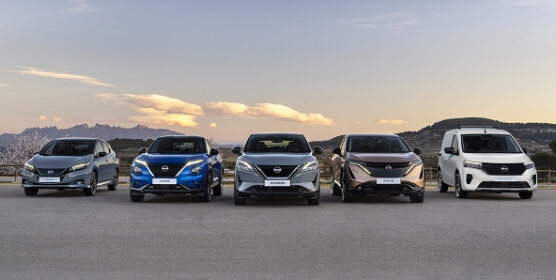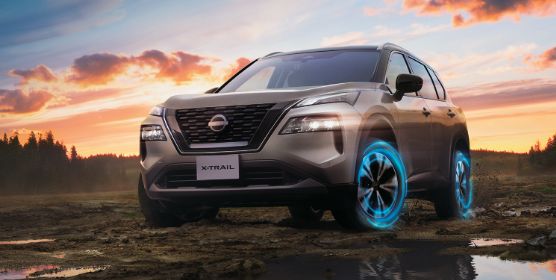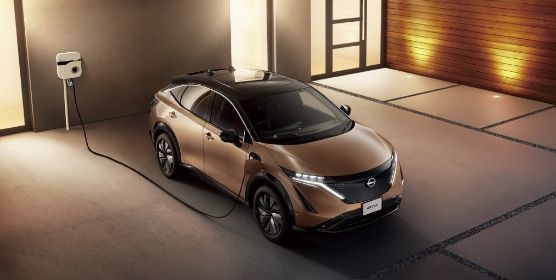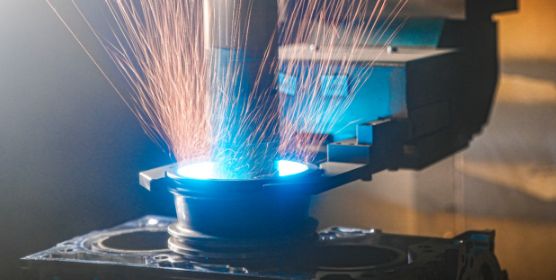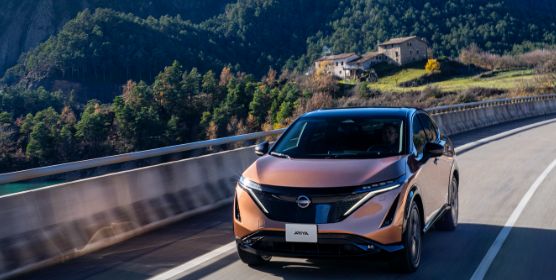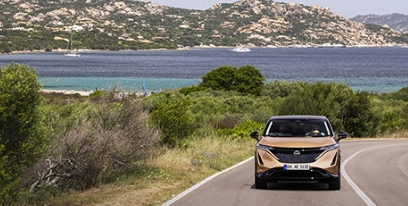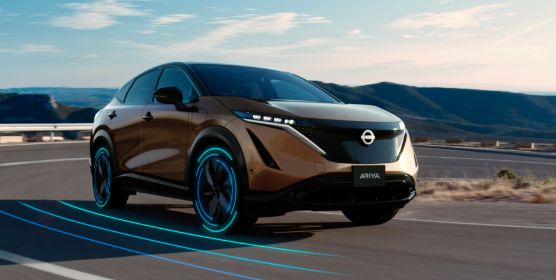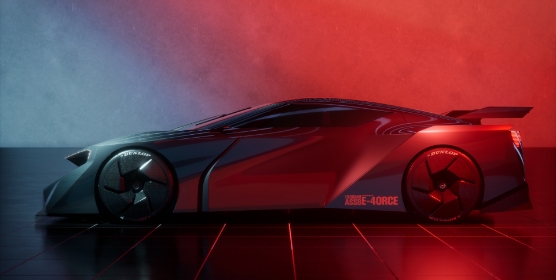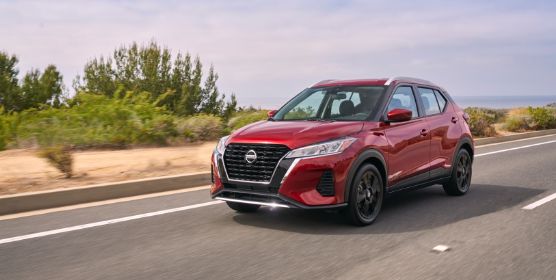Asako Hoshino, Executive Officer and Executive Vice President
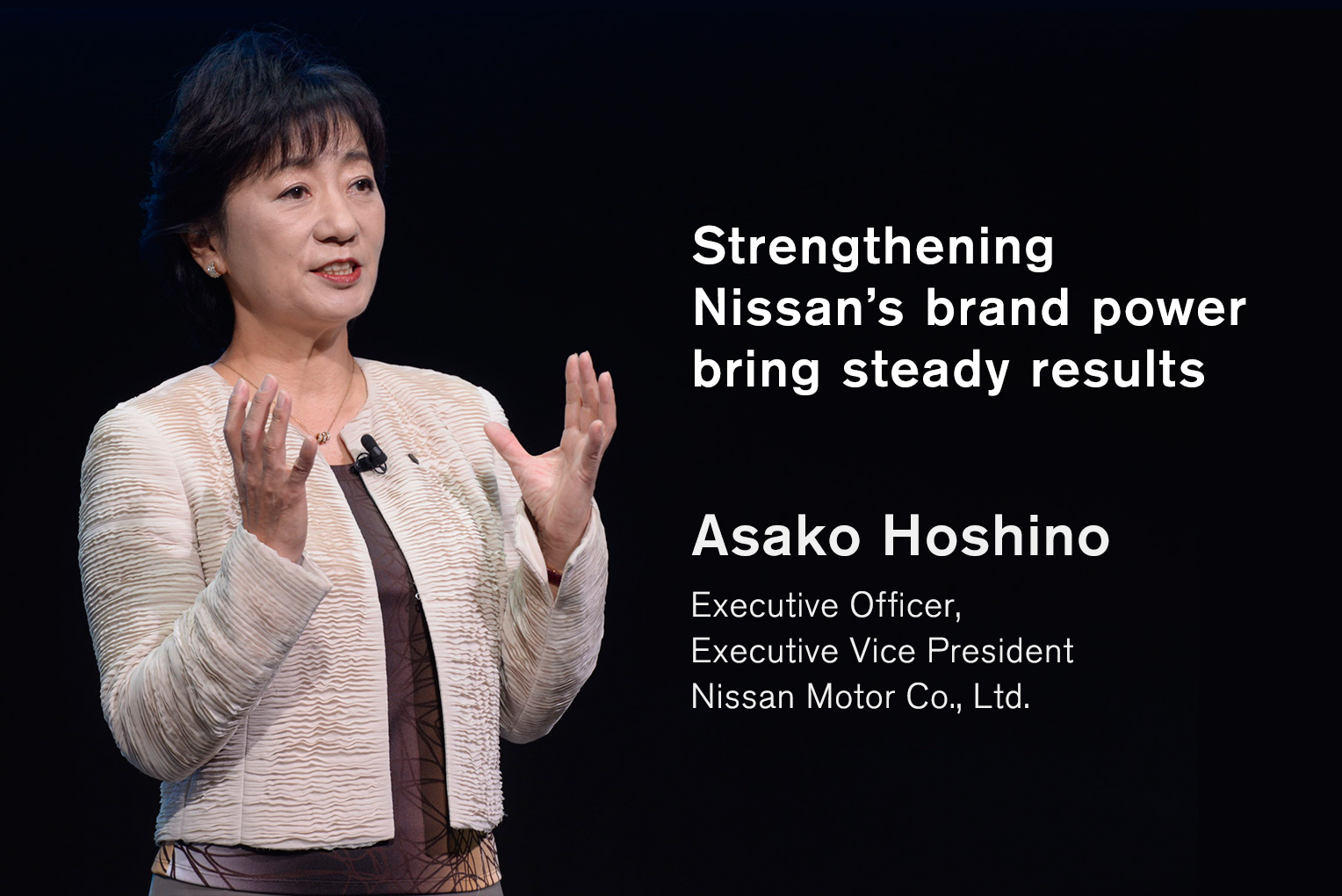
Making the Nissan name resonate is key to enhancing brand value
The
foundation
of
brand
power
lies
in
the
thoughts
that
come
to
mind
when
people
hear
the
name
“Nissan.”
What
is
the
brand
to
them?
What
makes
it
unique?
Does
it
have
a
positive
image?
Five
years
ago,
when
I
was
in
charge
of
the
Japanese
market
for
the
company,
my
focus
was
on
creating
these
kinds
of
associations
with
the
name.
So,
what
are
Nissan’s
strengths
and
features
that
represent
the
corporate
image?
The
answer
is
the
wide
range
of
technologies
developed
as
an
automaker.
The
mission
of
Nissan,
whose
corporate
purpose
is
“driving
innovation
to
enrich
people’s
lives”,
is
to
contribute
to
the
solving
of
society’s
problems.
While
automobiles
provide
convenience
and
enjoyment
to
people’s
lives,
automakers
are
also
facing
crucial
issues
like
greenhouse
gas
emissions,
traffic
accidents
and
traffic
congestion.
Nissan
has
developed
a
variety
of
technologies
and
promptly
introduced
them
to
the
market
as
it
strives
toward
its
goal
of
achieving
zero
emissions,
through
the
elimination
of
CO2
emissions
from
Nissan
vehicles,
and
zero
fatalities,
by
reducing
the
number
of
deaths
from
traffic
accidents
involving
Nissan
vehicles
to
virtually
zero.
Through
these
initiatives,
Nissan
is
producing
technologies
from
its
corporate
DNA
of
daring
to
do
what
others
don’t.
As
part
of
its
efforts
toward
zero
emissions,
Nissan
launched
the
Nissan
LEAF,
a
mass-produced
100%
electric
vehicle
in
2010.
The
Nissan
LEAF’s
contribution
to
zero
emissions
goes
beyond
reducing
CO2
emissions.
Its
battery
allows
owners
to
efficiently
use
renewable
energy
with
unstable
power
generation.
It
can
also
serve
as
a
mobile
power
source
in
the
event
of
a
disaster.
As
part
of
promoting
the
“Electrify
Japan
=
Blue
Switch”
action,
Nissan
signed
cooperative
agreements
with
over
100
local
governments
on
initiatives
related
to
the
environment,
disaster
countermeasures,
energy
management,
tourism
and
depopulation.
In
the
area
of
zero
fatalities,
Nissan
introduced
a
number
of
world-leading
safety
technologies
based
on
the
Safety
Shield
concept
that
helps
protect
people.
The
ProPILOT
technology
for
assisted
highway
driving
draws
from
the
continuous
development
of
safety
technologies
over
many
years.
In
the
future,
we
intend
to
make
this
advanced
autonomous
driver-assistance
technology
a
standard
feature
in
all
our
vehicles,
ahead
of
the
industry.
This
technological
evolution
will
also
contribute
to
the
reduction
in
traffic
congestion.
As
a
result
of
these
activities,
the
name
Nissan
has
become
synonymous
with
EVs
and
autonomous
driving
in
Japan.
Many
customers
in
China
are
also
aware
that
Nissan
is
a
technologically
advanced
brand.
These
areas
have
become
a
strength
for
Nissan
and
the
“face”
of
the
brand.
Penetrating Nissan’s technical prowess at every touchpoint
At
Nissan,
marketing
focused
on
products
in
the
past.
This
resulted
in
distinctive
profiles
for
vehicles
like
the
Skyline,
Nissan
GT-R,
Fairlady
Z
and
Serena,
but
the
image
of
Nissan
brand
that
put
together
these
vehicles
remained
underdeveloped.
We
were
nonetheless
able
to
sell
vehicles.
However,
the
auto
industry
faces
a
major
transformation
as
customers
are
changing
significantly
in
their
mindset
and
behavior.
In
the
past,
customers
would
visit
dealerships
several
times
to
research
and
test-drive
vehicles,
as
a
basis
of
comparison
in
making
their
final
purchase
decision.
These
days,
customers
can
readily
access
information
online.
Approximately
70%
of
customers
know
in
advance
which
car
they
want
to
purchase
by
the
time
they
visit
a
dealership.
In
addition,
there
are
more
repeat
customers
who
purchase
the
same
brand
they
previously
owned.
Therefore,
it
is
essential
for
customers
to
follow
us
and
have
a
positive
view
of
our
brand
by
the
time
they
are
ready
to
purchase
a
vehicle
for
the
first
time.
In
order
to
ensure
that
customers
have
that
mindset,
we
launched
the
“Yacchae”
Nissan
brand
campaign.
This
campaign
highlighted
Nissan’s
technical
prowess
as
the
“face”
of
the
brand
and
clearly
emphasized
the
technologies
in
each
vehicle
as
well
as
the
value
that
those
technologies
bring
to
the
customer.
It
is
particularly
important
that
customers
can
feel
the
driving
excitement
that
every
Nissan
vehicle
provides,
which
was
made
possible
with
Nissan’s
technologies.
However,
a
brand
cannot
be
reinforced
through
TV
commercials
alone.
We
cannot
communicate
widely
a
brand
image
of
technical
prowess
without
showcasing
our
outstanding
technologies
at
every
customer
touchpoint,
including
the
dealership
experience.
Communication
with
Nissan
employees
is
also
important.
Every
available
tool
must
be
utilized
for
information
sharing
and
education,
in
order
to
enable
our
employees
to
be
ambassadors
and
convey
Nissan’s
appeal.

Restoring sales power with new models that excite customers
Our
strategy
to
restore
global
sales
is
to
focus
our
efforts
on
new
models
with
the
potential
to
be
number
one
in
their
respective
segment,
rather
than
trying
to
increase
our
coverage
rate
for
the
entire
market.
Specifically,
our
focus
will
be
on
the
all-new
Nissan
Rogue
in
the
US
and
the
all-new
Nissan
Note
in
Japan.
The
all-new
Nissan
Note,
with
its
second-generation
e-POWER
electrified
powertrain,
is
one
example
of
the
ongoing
Nissan
Intelligent
Mobility
initiative
to
lead
automobiles
into
the
future
and
become
a
more
exciting
brand.
By
developing
and
launching
new
vehicles
with
an
emphasis
on
electrification
and
autonomous
driving,
we
aim
to
raise
our
brand
value
and
recover
our
market
share.
In
Nissan’s
home
market
of
Japan,
we
plan
to
introduce
two
new
EV
models
and
four
models
equipped
with
e-POWER
by
the
end
of
fiscal
year
2023,
so
that
Nissan’s
overall
electrification
ratio
could
reach
60%.
The
appeal
of
electrified
vehicles
can
only
be
grasped
by
driving
one.
Since
e-POWER
vehicles
are
more
affordable
than
EVs,
they
have
an
important
role
in
allowing
more
people
to
experience
that
appeal.
Furthermore,
the
Nissan
Ariya,
the
flagship
model
of
Nissan
Intelligent
Mobility,
is
scheduled
to
launch
in
fiscal
year
2021.
The
Nissan
Ariya
is
equipped
with
cutting-edge
electrification
technology,
intelligent
functions
and
connectivity.
Its
innovative
interior
and
exterior
caused
a
sensation
when
it
was
unveiled
in
July
2020.
The
true
appeal
of
the
Nissan
Ariya
and
the
amazing
driving
performance
from
electrification
have
to
be
experienced
firsthand
on
the
road.
Although
the
vehicle
moves
briskly,
the
cabin
space
is
incredibly
quiet.
The
ride
is
comfortable
and
luxurious
and
any
customer
that
drives
one
will
want
to
buy
the
Nissan
Ariya.
We
need
our
customers
to
truly
understand
that
the
Nissan
LEAF
and
Nissan
Ariya
are
EVs
that
are
worth
the
price.
For
our
marketing
and
sales
divisions,
the
current
challenge
is
to
clearly
convey
the
appeal
of
EVs
as
Nissan
pioneers
a
new
age
of
electric
vehicles
that
offer
the
values
of
an
automobile,
as
well
as
a
mobile,
rechargeable
battery.
Appealing to customers of all generations
Nissan’s
corporate
reputation
suffered
due
to
the
cases
of
misconduct
in
recent
years
and
largely
impacted
the
Japanese
market.
In
order
to
regain
trust,
we
must
reexamine
Nissan’s
image
as
a
company,
which
includes
enhancing
its
governance
system
and
corporate
culture.
We
must
also
renew
our
brand
image.
Our
new
company
logo
has
an
important
role.
Actually,
plans
were
underway
to
change
the
logo
prior
to
the
misconduct
cases.
Our
previous
logo
was
created
two
decades
ago,
and
people’s
lives
and
the
nature
of
automobiles
had
changed
significantly.
Communication
became
primarily
digital;
many
people
now
communicate
through
social-networking
sites
and
this
has
considerable
influence
on
their
lives.
Therefore,
a
company
logo
that
could
reach
new
customers
in
a
two-dimensional,
digital
medium
for
this
new
era
was
required.
The
shift
to
the
new
logo
began
with
the
all-new
Nissan
Note
e-POWER,
and
it
spread
further
via
social
media
due
to
the
positive
response
from
young
customers.
Nissan
also
introduced
a
car-sharing
service
for
electrified
vehicles
called
“e-share
mobi”,
and
many
young
drivers
have
used
it.
This
has
helped
electrified
vehicles
capture
new
customers.
In
addition,
Nissan
established
“brand
experience
stores”
in
major
shopping
centers
and
other
facilities.
The
aim
is
to
not
directly
sell
vehicles
but
to
offer
customers,
who
generally
do
not
visit
dealerships,
the
opportunity
to
experience
Nissan
vehicles.
In
Japan,
we
also
introduced
the
“Hello
Nissan”
program,
which
allows
customers
to
experience
advanced
technologies.
Similarly,
the
objective
is
not
sales.
By
contrast,
it
offers
customers
a
driving
course
that
is
optimally
designed
to
experience
Nissan’s
advanced
technologies
and
interact
positively
with
the
brand.
Digital
tools
are
indispensable
to
strengthening
Nissan’s
sales
power.
The
use
of
artificial
intelligence
(AI)
to
provide
support
allows
us
to
thoroughly
explain
vehicles
to
customers
in
every
region.
By
widely
introducing
new
dealer
management
systems
like
this
in
the
future,
we
will
raise
the
accuracy
of
AI
communications
so
that
we
can
provide
precise
services.
In
addition,
Nissan
is
improving
its
digital
market
support
to
allow
customers
the
option
to
purchase
vehicles
without
visiting
dealerships.
In
2020,
the
COVID-19
pandemic
had
a
major
impact
on
automobile
sales.
This
led
to
the
decrease
in
the
number
of
visits
to
Nissan
dealers.
Accelerating
the
development
of
digital
market
support
is
one
way
to
address
this
problem.
Amid
the
pandemic,
many
customers
view
personal
automobiles
as
a
safer
option
than
public
transportation,
so
there
has
not
been
a
decline
in
interest
to
purchase
vehicles.
By
launching
vehicles
that
customers
want
with
the
right
timing
and
strengthening
digital
sales,
Nissan
can
improve
its
sales
power
even
in
the
midst
of
this
pandemic.
For
example,
in
the
United
States
and
Mexico,
plans
have
begun
to
complete
the
entire
vehicle
purchasing
process
online.
A
variety
of
new
initiatives
are
underway
in
major
markets,
such
as
live
chats
and
live
video
functions
online
to
reply
to
customers’
questions
and
concerns
and
offer
customers
test-drives
of
Nissan
vehicles
at
or
near
their
homes
without
physical
contact
with
sales
staff.
At
the
same
time,
many
customers
still
prefer
to
purchase
a
vehicle
by
visiting
a
dealer,
so
we
are
accelerating
the
introduction
of
a
system
that
will
combine
on-site
sales
and
online
services
in
a
seamless
manner.
Nissan’s
revival
depends
on
whether
we
can
deliver
“Nissan-ness”
to
our
customers.
We
hope
that
everyone
on
the
frontline
of
sales
will
do
their
best
to
help
restore
trust
in
the
Nissan
brand.
Published in March 2021



